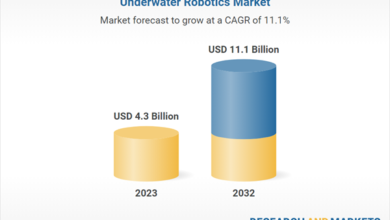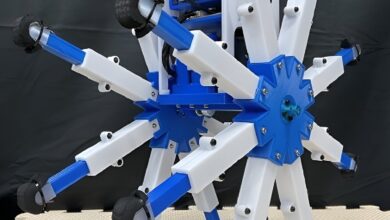Modular Robotics Market Will Reach at CAGR of 18.23% by 2031

The global modular robotics market is experiencing a significant surge in growth, driven by advancements in automation and increasing demand for efficient manufacturing processes. Modular robotics, which involves the use of multiple robotic units that can be reconfigured to perform various tasks, is becoming a critical component in industries such as automotive, electronics, healthcare, and logistics. The market is expected to grow at a robust CAGR over the next decade, reflecting the expanding applications and technological innovations in this field.
Market Analysis
Modular Robotics Market size was estimated at USD 10.51 billion in 2023 and is expected to reach USD 40.2 billion by 2031 at a CAGR of 18.23% during the forecast period of 2024-2031. Key regions driving this growth include North America, Europe, and Asia-Pacific, with the latter witnessing the fastest expansion due to the increasing industrialization and adoption of advanced manufacturing technologies in countries like China, Japan, and South Korea.
Download Sample Copy of Report: https://www.snsinsider.com/sample-request/3629
Top Key Players:
ABB Ltd., Acutronic Robotics, KUKA AG, Mitsubishi Electric Corp., FANUC Corporation, Kawasaki Heavy Industries Ltd., Yaskawa Electric Corporation, Denso Corporation, Universal Robots, Nachi-Fujikoshi Corp., Rethink Robotics, and others.
Market Scope
The modular robotics market encompasses various types of robots, including articulated modular robots, Cartesian modular robots, SCARA modular robots, and collaborative modular robots. These robots are used in a range of applications such as assembly, welding, painting, material handling, and inspection. The versatility of modular robotics allows them to be tailored for specific industrial needs, making them indispensable across different sectors.
Market Drivers
Several factors are propelling the growth of the modular robotics market:
Advancements in Automation: The continuous improvement in automation technologies is a significant driver, enabling more complex and precise robotic tasks.
Industry 4.0: The integration of IoT, AI, and machine learning in manufacturing processes is creating a conducive environment for the adoption of modular robotics.
Labor Shortages: In regions facing labor shortages, modular robots are increasingly being used to fill the gap, ensuring consistent productivity.
Cost Efficiency: Modular robots offer a cost-effective solution by reducing the need for multiple dedicated machines and allowing for quick reconfiguration and redeployment.
Market Segmentation:
By Robot Type
Articulated modular robots
Cartesian modular robots
SCARA modular robots
Parallel modular robots
Collaborative modular robots
Other modular robots
Spherical robots
Cylindrical robots
By Industry
Automotive
Electrical and Electronics
Plastic, Rubber, and Chemicals
Metals and Machinery
Food & Beverages
Precision Engineering and Optics
Pharmaceuticals and Cosmetics
Others
Access Full Report: https://www.snsinsider.com/reports/modular-robotics-market-3629
Market Dynamics
The dynamics of the modular robotics market are shaped by several trends and factors:
Technological Innovations: Ongoing R&D efforts are leading to the development of more sophisticated modular robots with enhanced capabilities.
Customization and Flexibility: The ability to customize robots for specific tasks is a major advantage, driving their adoption across diverse industries.
Regulatory Environment: Stringent safety and operational regulations in industries such as automotive and healthcare are influencing the design and deployment of modular robots.
Supply Chain Resilience: The COVID-19 pandemic has highlighted the importance of resilient supply chains, where modular robots play a critical role by ensuring continuous production without human intervention.
Market Opportunities
The modular robotics market presents numerous opportunities for growth and expansion:
Healthcare Sector: The adoption of modular robotics in healthcare for applications such as surgery, diagnostics, and rehabilitation is growing, offering significant market potential.
E-commerce and Logistics: The boom in e-commerce is driving the need for automated warehouses and distribution centers, where modular robots can optimize operations.
Small and Medium Enterprises (SMEs): Increasing awareness and affordability of modular robotics are making them accessible to SMEs, broadening the market base.
Green Manufacturing: Modular robots can contribute to sustainable manufacturing practices by optimizing resource usage and reducing waste.
Market Key Factors
Several key factors are crucial for the success and expansion of the modular robotics market:
Innovation and R&D: Continuous investment in R&D is essential for developing advanced modular robots that can perform complex tasks with higher efficiency.
Strategic Partnerships: Collaborations between robotics manufacturers and end-user industries can drive innovation and customization, enhancing market penetration.
Skilled Workforce: The availability of a skilled workforce capable of operating and maintaining modular robots is vital for their effective deployment.
Customer Education: Educating potential customers about the benefits and applications of modular robotics is important for driving adoption.
Challenges
Despite the promising growth, the modular robotics market faces several challenges:
High Initial Costs: The initial investment required for deploying modular robots can be significant, posing a barrier for smaller companies.
Technical Complexity: The complexity involved in programming and integrating modular robots into existing systems can be a challenge for some industries.
Regulatory Compliance: Adhering to stringent regulatory standards, particularly in safety-critical industries like healthcare and automotive, can be challenging.
Market Competition: The presence of numerous players in the market leads to intense competition, necessitating continuous innovation and cost management.
Buy Complete Report: https://www.snsinsider.com/checkout/3629
In conclusion, the modular robotics market is poised for substantial growth, driven by technological advancements, industry demand, and the need for efficient manufacturing solutions. While challenges exist, the opportunities and potential for innovation make this an exciting and dynamic market to watch in the coming years.
About Us:
SNS Insider is one of the leading market research and consulting agencies that dominates the market research industry globally. Our company’s aim is to give clients the knowledge they require in order to function in changing circumstances. In order to give you current, accurate market data, consumer insights, and opinions so that you can make decisions with confidence, we employ a variety of techniques, including surveys, video talks, and focus groups around the world.
Our staff is dedicated to giving our clients reliable information, and with expertise working in the majority of industrial sectors, we’re proud to be recognized as one of the world’s top market research firms. We can quickly design and implement pertinent research programs, including surveys and focus groups, and we have the resources and competence to deal with clients in practically any company sector.
Contact Us:
Akash Anand – Head of Business Development & Strategy
info@snsinsider.com
Phone: +1-415-230-0044 (US) | +91-7798602273 (IND)
This release was published on openPR.



